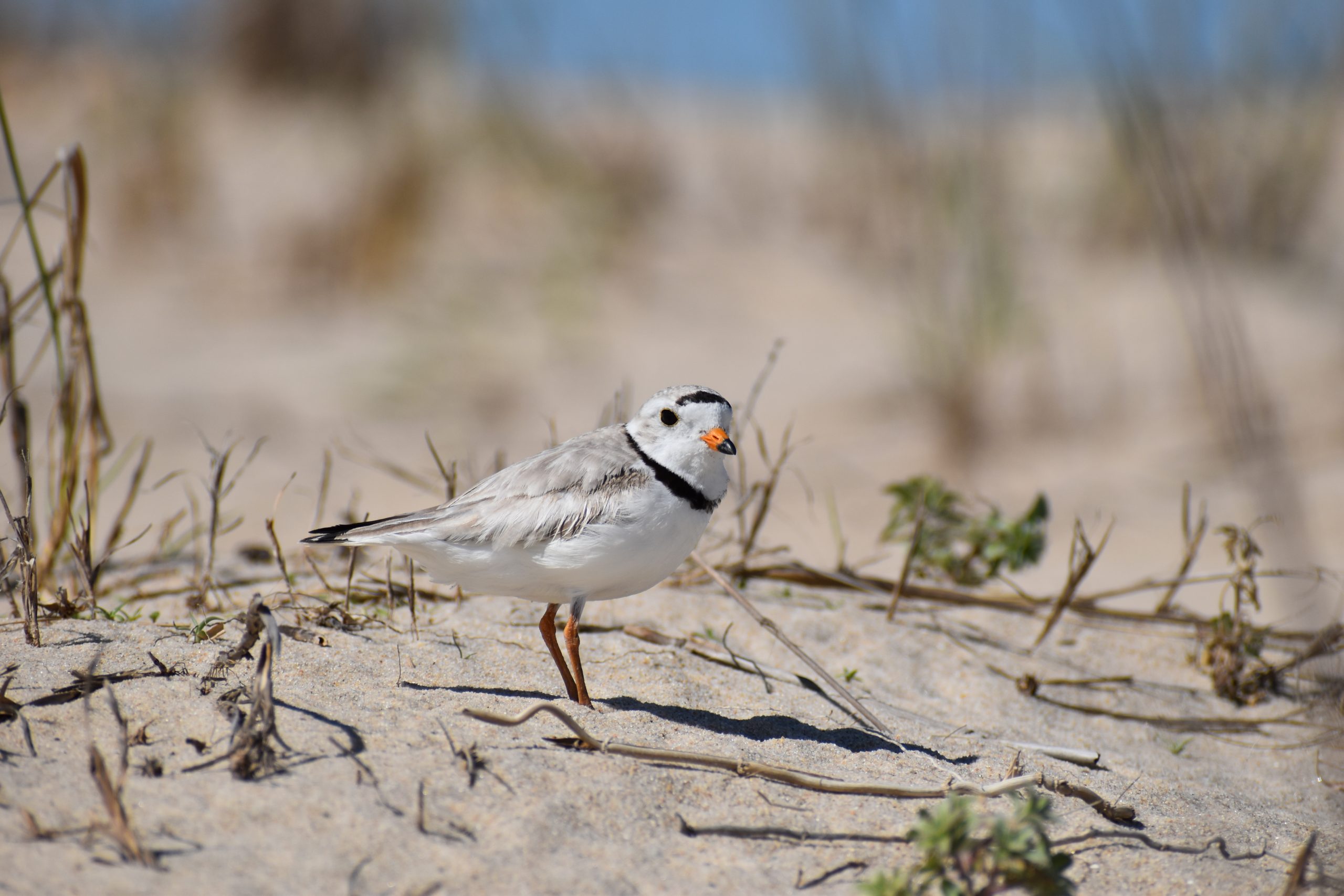DNREC to Offer Training For Volunteer Beach-nesting Bird Monitors
Department of Natural Resources and Environmental Control | Division of Fish and Wildlife | Newsroom | Date Posted: Monday, April 25, 2022
Department of Natural Resources and Environmental Control | Division of Fish and Wildlife | Newsroom | Date Posted: Monday, April 25, 2022

A piping plover forages along a Delaware beach in spring of 2020 /DNREC photo
Important Effort For Helping to Protect Endangered and Threatened Birds
Volunteers wanting to help protect Delaware’s beach-nesting birds, including federally-listed threatened piping plovers and state-listed endangered American oystercatchers, are invited to join a training session held from 10 a.m. to noon on Saturday, May 7 at the Cape Henlopen State Park Officers Club (Youth Camp III) Mess Hall located at 15099 Cape Henlopen Drive, Lewes 19958, the Delaware Department of Natural Resources and Environmental Control announced today.
The volunteer training session, offered by the DNREC Division of Fish and Wildlife beach-nesting bird monitoring program, will begin with light refreshments and a slideshow presentation, followed by a discussion about the monitoring program and how volunteers can help to ensure that beach-nesting shorebirds are not disturbed while nesting and rearing their chicks during the summer months. Weather permitting, the group will finish the training session by venturing out to the Point at Cape Henlopen to look for piping plovers and other shorebirds likely to be feeding on the tidal flats. Birding scopes and binoculars will be available for use, but volunteers are encouraged to bring their own optics if they have them.
Volunteers are an important and valued component of the DNREC Division of Fish and Wildlife’s conservation efforts. Stationed on the boundaries of the bird nesting areas, volunteers explain to beachgoers the importance of closing sections of the beach to prevent human disturbance thus helping increase the nesting success of the birds.
Pre-registration for the training is encouraged, but volunteer walk-ups also will be accepted for training as beach-nesting bird monitors. Cape Henlopen State Park entrance fees will be waived for volunteers attending the training. For more information on the training, beach-nesting birds, or volunteer monitoring efforts, visit de.gov/pipingplovers or contact DNREC Coastal Avian Biologist Henrietta Bellman by emailing deshorebirds@delaware.gov.
About DNREC
The Delaware Department of Natural Resources and Environmental Control protects and manages the state’s natural resources, protects public health, provides outdoor recreational opportunities, and educates Delawareans about the environment. The DNREC Division of Fish and Wildlife conserves and manages Delaware’s fish and wildlife and their habitats, and provides fishing, hunting, wildlife viewing and boating access on nearly 68,000 acres of public land. For more information, visit the website and connect with @DelawareDNREC on Facebook, Twitter or LinkedIn.
Media Contacts: Michael Globetti, michael.globetti@delaware.gov; Nikki Lavoie, nikki.lavoie@delaware.gov
Keep up to date by receiving a daily digest email, around noon, of current news release posts from state agencies on news.delaware.gov.
Here you can subscribe to future news updates.
Department of Natural Resources and Environmental Control | Division of Fish and Wildlife | Newsroom | Date Posted: Monday, April 25, 2022

A piping plover forages along a Delaware beach in spring of 2020 /DNREC photo
Important Effort For Helping to Protect Endangered and Threatened Birds
Volunteers wanting to help protect Delaware’s beach-nesting birds, including federally-listed threatened piping plovers and state-listed endangered American oystercatchers, are invited to join a training session held from 10 a.m. to noon on Saturday, May 7 at the Cape Henlopen State Park Officers Club (Youth Camp III) Mess Hall located at 15099 Cape Henlopen Drive, Lewes 19958, the Delaware Department of Natural Resources and Environmental Control announced today.
The volunteer training session, offered by the DNREC Division of Fish and Wildlife beach-nesting bird monitoring program, will begin with light refreshments and a slideshow presentation, followed by a discussion about the monitoring program and how volunteers can help to ensure that beach-nesting shorebirds are not disturbed while nesting and rearing their chicks during the summer months. Weather permitting, the group will finish the training session by venturing out to the Point at Cape Henlopen to look for piping plovers and other shorebirds likely to be feeding on the tidal flats. Birding scopes and binoculars will be available for use, but volunteers are encouraged to bring their own optics if they have them.
Volunteers are an important and valued component of the DNREC Division of Fish and Wildlife’s conservation efforts. Stationed on the boundaries of the bird nesting areas, volunteers explain to beachgoers the importance of closing sections of the beach to prevent human disturbance thus helping increase the nesting success of the birds.
Pre-registration for the training is encouraged, but volunteer walk-ups also will be accepted for training as beach-nesting bird monitors. Cape Henlopen State Park entrance fees will be waived for volunteers attending the training. For more information on the training, beach-nesting birds, or volunteer monitoring efforts, visit de.gov/pipingplovers or contact DNREC Coastal Avian Biologist Henrietta Bellman by emailing deshorebirds@delaware.gov.
About DNREC
The Delaware Department of Natural Resources and Environmental Control protects and manages the state’s natural resources, protects public health, provides outdoor recreational opportunities, and educates Delawareans about the environment. The DNREC Division of Fish and Wildlife conserves and manages Delaware’s fish and wildlife and their habitats, and provides fishing, hunting, wildlife viewing and boating access on nearly 68,000 acres of public land. For more information, visit the website and connect with @DelawareDNREC on Facebook, Twitter or LinkedIn.
Media Contacts: Michael Globetti, michael.globetti@delaware.gov; Nikki Lavoie, nikki.lavoie@delaware.gov
Keep up to date by receiving a daily digest email, around noon, of current news release posts from state agencies on news.delaware.gov.
Here you can subscribe to future news updates.